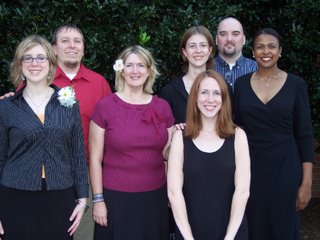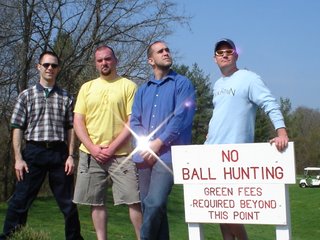Wednesday, May 24, 2006
What's in a name?
The word that has been on my heart is "pastor." It has such beautiful and rich original connotations. Today, it generally means, "congregational leader" or "preacher." It often refers to the "one in charge." The connotations that it has today give an image of someone who preaches on Sundays, hires and fires staff, creates a vision for the church, performs weddings and funerals, and generally is the "public face" of the church. You might expect the pastor to visit you in the hospital (or at least one of the pastors).
But the original word (and use) had such different connotations and images associated with it. The words often translated "pastor" are words that mean "to shepherd." It was used to refer to the responsibilities and actions of "elders" ("bishops"). The image was one of a dedicated watchman over a flock of sheep. The shepherd watches and cares for every single sheep because his very life and livlihood was intertwined with them. He "feeds the flock," not by spoon feeding; rather, a shepherd leads the flock to pastures where they can feed themselves. The pastors (since there were often more than one to protect large flocks... think the shepherds at the birth of Jesus) kept a close eye on the flock, to make sure that predators did not enter. If one wandered away, the shepherd was there to search for and find it. If needed, the shepherd/pastor would bind up wounds. Pastors knew their flock. Jesus is called the Great Pastor (Shepherd). You can see why. He knows each sheep individually.
The "pastors" of today rarely know anyone in the flock other then the "leading men and women" who provide the most financial support and the rest of the paid staff. The modern "elders" are often little more than a budget-approving board of directors. They often don't know much of the flock, and often have no idea what the sheep are getting into. But that is what the societal change (as well as the institutional change in the church) has resulted in. The "shepherd" of today has hirelings gather the flock into the barn, and then dishes out some stale hay.
Should we reclaim (redeem?) the title of "pastor?" Maybe we should let "preachers", "leaders", and "evangelists" be just that, and let the elders/bishops/pastors get back to the job of knowing the flock. Can you imagine what would happen if our churches actually had pastors who did not have to present a message every Sunday or preside at funerals (preacher), and did not have to lead revivals or write curriculum (evangelists), but rather got their hands dirty as they actively worked with the flock, to lead them (teach them) to pastures where the know how to feed themselves? Where the pastors actually know the sheep, and know when one is in trouble (without having to hear it fourth hand 2 months later)? Where the pastors bind up the wounded, and care for the sick (both physically and spiritually)?
I may be a matter of semantics. But I think we have lost an important role that is so vital to church health in letting semantic drift change the church's understanding of "pastor." I am a natural leader, but I'm a horrible evangelist. I'm an ok preacher, but my goal and heart is to become a pastor of God's flock. God, hear my prayer, Amen.
Generations and memories
 I remember a picture of me when I was very young, sitting on my great-grandfather's lap.
I remember a picture of me when I was very young, sitting on my great-grandfather's lap.When my grandma (Helen... in the picture) sent this picture to me for my birthday, it brought back that old image so vividly. That is my nephew, Brandon, sitting on his great-grandmother's lap. It was taken in April, when everyone came over to my parent's house to visit me since I was in town (I subsequently got very sick when everyone got there, and ended up in the emergency room with dehydration... but that's another story.... and I have no idea what's on his face).
I have been so richly blessed with my family. I got to know and appreciate my dad's dad (Ed... who is now deceased), and my dad's mom (Oma Helen) and my mom's mom (above). My maternal grandfather died when I was... about 9 or so. Anyway, this picture reminded me so much of the love I had and still have in my family. I am glad that Brandon in growing up in that. I hope he knows how blessed he is.
Friday, May 19, 2006
Random thoughts on division and heritage
But a recent conversation has brought out another issue. We have been discussing where "we" as individuals and where "we" as a former house church go from here, in terms of "church." The two of us had some incredible time of sharing, envisioning, and praying last night with a couple of our friends. On the way home, we started talking about what this all meant; what did we want to share with the group about our individual journeys. As we shared how we would like to get from where we are spiritually now, to where we want to be, we realized that there appeared to be a significant difference.
I'm still trying to analyze and characterize the differences, but I think that one of the major underlying difference lies in our understanding of division/unity. I really saw this at the Global Night Commute. That night, there was a large group of people singing songs to God. It was awesome. Except it was mostly songs that I/we (the group I came with) didn't know. I enjoyed it, and when I could, I participated. The group I came with (6 people) for the most part were busy during that time writing letters to Congressman. Anyway, I know that a couple wanted to sing some songs that we have memorized... some of them four part harmony. So, after the other group was done singing for awhile, I mentioned to my friend that we could do our singing now. He said he would have no part of it. "Why?" I asked. He felt that it would be divisive. He felt that if the whole group wasn't doing it, then if we did our own thing, we would be clique-ish, and divisive. I didn't agree with him then, nor do I agree with him now. But we didn't sing that night.
You see, I see division differently than he does. This is how I viewed the whole thing. So, there is a large group singing songs that we didn't really know. You can't really participate in that, so many just stayed on the side, writing letters and listening. (Was the large group being divisive, because they were singing songs that some of us didn't know and didn't feel comfortable participating in?) Later, after the group had pretty much disbanded, I suggested that our group sing praises to God.. the ones that we know and can participate in. We would not be "competing" with the other group... they were done. We would not be exclusive, because we would have loved anyone to join us (that's how the first group got started singing anyway). Was singing songs that many people didn't know being "divisive?" I don't think so.
Being a leader means that sometimes you will be doing things that are different. Some may know what's going on, some won't. But in doing so, you can start something that brings the whole group together. But someone has to start doing something somewhere. For example, if we were to join another church, or start one, I would want the practice of the Blessing to be a part of that spiritual community. Now, if the others in that community have never participated in a blessing, and don't see the benefit, and don't initially see the value and so don't participate, and yet I gather those in the community who do see the value, and we continue the praxis of the Blessing, then am I being divisive? Exclusive? I hope not. I don't think so. In fact, it is the only way to begin to share the wonderful blessings of the Blessing tradition... by having a group that continues on, providing a way of showing people what it is (see the previous entry from today).
The practice of the Blessing is now part of my spiritual heritage that I want to continue, and pass on to my kids... even if the rest of my "church" doesn't value or participate. The same could be said of memorization and singing of 2-4 part a cappella songs. I enjoy that style of worship. I also value the training it gives in learning to read music, and helping foster the ability to hear and sing harmonies. But most important to me, is that it allows for robust, powerful, and spontaneous praise and worship anywhere, anytime. I don't want me or my family to be so dependent on instruments that we can't start praising God anywhere without instruments. I think that a cappella music (which, by the way, comes from the Italian meaning, "in the manner of church or the chapel" and is an ancient Christian practice) is something wonderful that adds depth to the many other spirtual practices that the church can participate in.
So, let's say that I join a community of 100 Christians. And let's say that someone feels most connected to God when they fast for a whole day, once a week. This person gains incredible spiritual strength and power when doing so. So, this person shares this practice with several others. 15 people try it; but only 6 get anything from it. So, these six decide to meet every Thursday night, after a day of fasting, and share, sing, and pray. They decide to actually function as a small group on Thursdays. Since most small groups in this hypothetical church involve sharing food, and this group gets power from not eating, they might be a little different. But they invite people to their small group, and share, as they always do, what power and insight they have gained from fasting that day. Sure, some, if not most, visitors might feel uncomfortable, but some might see the group's witness and start that practice too. The group all goes to the main Sunday gathering; some participate in the creative team, others participate in the several service projects that the church does. In this scenario, is this group being divisive? Or creating and valuing a spiritual heritage?
Like all things taken to extreme, creating and valuing a spiritual heritage can be divisive. But that should not keep us from redeeming those special, unique practices. (Another example might be a group of people from a Catholic background, that get together and in a way that focuses entirely on God, uses the Rosary to have group prayer time.) Holding on to a heritage doesn't necessarily equate to division. In fact, in today's world, multiculturalism is the guiding principle in America. It is the idea that multiple cultural traditions and ideas can be valued and appreciated, and shared among all, without losing the uniqueness of that culture.
Hopefully, my best friend and I can realize that the differences we have are only apprearances. As I have written this, I have become more convinced of that. Because we are ultimately going in the same direction, and want the same core thing: to be a contributing part of a missional community of God on earth. May God empower us to be so.
Fellowship with "sinners"
In Brian McLaren's book, The Secret Message of Jesus (p. 162), the author sums this thought process up very well.
Jesus was often criticized for this "table fellowship" with notorious sinners; his critics assumed that Jesus' acceptance of these people implied approval and endorsement of their shabby behavior. But they misunderstood: Jesus wanted to help them experience transformation. Rejection hardens people, but acceptance makes transformation possible. By accepting and welcoming people into his presence, just as they were, will all their problems and imperfections, Jesus was exposing them to his example and to his secret message. In this way, he oculd challenge them to think--and think again--and consider becoming part of the kingdom of God so they could experience and participate in the transformation that flows from being in interactive relationship with God and others. [emphasis mine]Notice he doesn't say that acceptance guarantees transformation; it only makes it possible. The the alternative is guaranteed rejection and hardening. It is tragic that that has been my attitude for so long. God grant me the strength to meditate on this idea and figure out how to actually apply it.
Saturday, May 13, 2006
Richly Blessed in God's beautiful creation
 *This is my "front yard." It has a ridge of native white pine on it.
*This is my "front yard." It has a ridge of native white pine on it. *This is my garage/entry area.
*This is my garage/entry area. *This is my front porch. I love it. I just had three bushes of my favorite plant scent planted... lilacs.
*This is my front porch. I love it. I just had three bushes of my favorite plant scent planted... lilacs. *Side view of the house, looking out on the Tuscarawas River valley (Tusky Valley).
*Side view of the house, looking out on the Tuscarawas River valley (Tusky Valley). *This is the "back yard." It slopes pretty significantly, so this section is the only section that gets mowed. The white blossoms in the background are dogwoods.
*This is the "back yard." It slopes pretty significantly, so this section is the only section that gets mowed. The white blossoms in the background are dogwoods. *This is the view driving up my gravel driveway. The house is hidden to the left at the end.
*This is the view driving up my gravel driveway. The house is hidden to the left at the end. *This is the view from my sunroom.
*This is the view from my sunroom.
Some more random pictures

So, I decided it is time to share some pictures.
This was from June 2005, out in the back yard of my old house on 20th Street in Canton. I loved the Rhododendrons so much, I bought 3 of them and had them planted at my new house.

This picture is with my closest friends from Ohio. This was the original group of our house church. We were at a wedding (Scott and Amanda's) in Nashville in Oct 2005. From Right to left: Rachel T. (she's 17 there), me, Penny T. (Rachel and Rebecca's mom), Rebecca T. (kneeling), Tina and Jared C. (yup, Jared tried the bald thing for a short while), and Dana H.
 This pic was from the "guy's retreat" in Kentucky, I think in the Spring of 2005. That's Josh, Jared, Matthew, and Jon. Somehow, Josh and Jon didn't get the message on the sign! And I have no idea what sort of "bling" Matthew's sportin'.
This pic was from the "guy's retreat" in Kentucky, I think in the Spring of 2005. That's Josh, Jared, Matthew, and Jon. Somehow, Josh and Jon didn't get the message on the sign! And I have no idea what sort of "bling" Matthew's sportin'. This is my sister, Heidi, and my brother-in-law, Joe Zukas, with my nephew Brandon. This was in September 2004. Wow, has it been that long???
This is my sister, Heidi, and my brother-in-law, Joe Zukas, with my nephew Brandon. This was in September 2004. Wow, has it been that long???
Thursday, May 11, 2006
Revisioning Chritian Rituals
After discussing a "parable" about sheep and wolves, and pointing out that there seems to be just two options (have a large fence and be exclusive, or have no fence and risk being destroyed from within), he continues on page 165:
So, returning to our parable, we need a third option. A high fence that excludes everyone won't do, nor will no fence at all. What we need is a requirement that those who wish to enter actually have a change of heart--that they don't sneak in to accomplish their own agenda, but rather that they genuinely want to learn a new way of thinking, feeling, living, and being in "the pastures of God." Perhaps that is why baptism--a ritual washing indicating repentance and desire to begin again--was so important to Jesus' predecssor, John the Baptist; to Jesus and his disciples; and to the apostles who followed them. It was important to call people to a change of heart and give them a dramatic way of going public by saying, "Yes, this change of heart has happened within me, and I'm willing to identify myself publicly as a person who is on a new path." And perhaps the Christian ritual of Eucharist was intended to function in a similar way--a kind of regular recommitment where people say, by gathering around a table and sharing in bread and wine, that they are continuing Jesus' tradition of gathering in an inclusive community. "I'm still in," they're saying. "My heart is still in this mission and dream. I'm still committed."
Wow. What a beautiful, accurate, and exciting way to describe the "boring" and "worn out" Christian "rituals" of baptism and communion.
Wednesday, May 10, 2006
Parable Contest
Hello Jason,
One of my favorite parables is the parable of the fig tree found in Luke Chapter 13:6-9:
6Then Jesus used this illustration: "A man planted a fig tree in his garden and
came again and again to see if there was any fruit on it, but he was always
disappointed. 7Finally, he said to his gardener, `I've waited three years, and
there hasn't been a single fig! Cut it down. It's taking up space we can use for
something else.'8"The gardener answered, `Give it one more chance. Leave it
another year, and I'll give it special attention and plenty of fertilizer. 9If
we get figs next year, fine. If not, you can cut it down.' "
There are several reasons why this parable means so much to me.
1. Its direct call for repentance. Jesus had just heard of some murders by Pilate of Jews. Many, it would seem, argued that they must have had it coming. But Jesus points out clearly that it is them who must repent, or they would perish and not enter the Kingdom.
2. It shows God's expectations. God had planted a beautiful fig tree (Israel) in a garden, and expected it to produce fruit. But then Israel didn't produce fruit, and so was "wasting space", as well as energy. God isn't one to appreciate wastefullness.
3. Most importantly, it shows Jesus' mediatating effect. Not only did Jesus care for the tree (as the gardener) but he has mercy on the tree. "Give it a little more time." Jesus loved Israel, His people, and didn't want to see it perish. But more than just being patient, Jesus says he's going to give Israel all the care and fertilizer it could need to bring about repentance (fruit) so that it would not suffer the terrible fate it ultimately did. The apostles, and perhaps the church itself, were the fertilizer, trying to strengthen the remains of Israel to repentance.
Applying this parable today, I think one of the keys is that God loves His people, and that he will use lots of fertilizer (the church) to spur repentance and the fruit of godliness. It gives me a better idea of what the Kingdom of God is about... unappreciated waste (by human standards) being used to slowly give nutrients and life to those fruitless trees around it, with a goal not of "justice" or "clearing the space" by having the trees cut down, but in the hope of having trees that produce fruit to supply and beautify the whole garden.
Saturday, May 06, 2006
Uncomfortable Situations and Extending Compassion
Today, my best friends and I went with a group from First Christian Church of Canton to a "soup kitchen" based at Refuge of Hope. It is open every Friday and Saturday for lunch, and every Wednesday night for dinner. There were about 50 men and women there today. We went and served them food, and also cleaned up afterwards. The main thing that the Refuge wanted was for us to talk with people. They wanted us to just sit and eat with them, talk with them, lift them up. Now that was an uncomfortable situation for me. At least at first. I didn't know what to say. All the "normal" conversation starters were filled with landmines. For example, you can't say, "Hi, I'm Tony. Do you live around here? What do you do?" You get the picture. Although I managed to say a few things, it was pretty awkward. For all of us at my table. Then the minister asked for prayer requests. Three we given at my table. Then the minister asked for those Christian visiting today to go to these people and pray with them. When asking for volunteers, I looked around, and no one moved towards my table, so I volunteered to pray for two people. We ended up having six people at my end of the table, and I led a prayer. In the process I got to know three names. And pray for specific things. It was a totally new experience for me, but very uplifting. Anyway, after the prayer and worship time, when I sat down to eat with them, I got a little bit more information about some of the prayer requests.
Then everyone left. I did not have the usual "warm and fuzzy" feeling I often get when doing something good for others. I realize now why. When you really boil it down, our brief time at the kitchen didn't make a huge difference. Really. If we weren't there to serve, they would have gotten in line themselves. If we hadn't cleaned up, the staff would have. Normally, that would be enough to make me feel good, like I did something. But for me, it became just a token act. In the past, that would have been enough for me to say that I "serve the poor." But I can't say that. I met three people, two of which I know a little about their stories, and what they are going through. I did not help them directly today. But now I can start to see things from their perspective. I'm beginning to truly have compassion. And as such, I don't just want to serve them a tray of food, or pray with them. I want to help Mike get the job he's interviewing for tomorrow. I want to help him get back on his feet. But I didn't. I prayed, which relies on the greatest Power there is. But I didn't actually give anything of myself, other than two hours of time, time that would have likely been wasted anyway; it was not sacrificial time.
I guess what I'm trying to say is that I am starting to have compassion, by putting myself in uncomfortable situations, and actually wanting to make a difference. Token acts or alms, if not coupled with true compassion, will be in vain for me. I don't know yet how to actually show compassion for those three people I met today. But I feel that I have truly begun on a journey of true kingdom living.
Thoughts on Paid Church Leadership
I have long struggled with the common Christian practice of having huge paid church "staffs" that cover everything from daycare to Senior Pastor, from janitor to secretary to Youth Pastor. I come from a spiritual heritage where large church staffs are uncommon. In college I struggled with the concept of even paying the secretary, when that money could be going to something more "productive" in the kingdom. (I later found out that the elders used that as a means of helping that woman and her family who had some financial needs.)
Now, I know that Paul, over and over again, emphasizes that those who dedicate their lives to the work of the gospel of Christ should be rewarded (honored) financially, at least be given the necessities of life (see I Cor. 9.11-14; 1 Tim. 5.17-18). I can't deny that God made provision for the priests of the Old Covenant, who were to dedicate their lives to ministering, sacrificing, singing, composing music, guarding the temple, etc. And it is just; those who work to spread and build the kingdom of God truly are worthy of our honor (with money).
Interestingly, Paul didn't use his "right", at least not fully. We know that he did work, at least at times, as a tent maker. And right after proclaiming his right to be compensated for his work in the kingdom with the Corinthians, he states (in 1 Cor. 9.11,17-19):
11We have planted good spiritual seed among you. Is it too much to ask, in return, for mere food and clothing? 12If you support others who preach to you, shouldn't we have an even greater right to be supported? Yet we have never used this right. We would rather put up with anything than put an obstacle in the way of the Good News about Christ.17If I were doing this of my own free will, then I would deserve payment. But God has chosen me and given me this sacred trust, and I have no choice. 18What then is my pay? It is the satisfaction I get from preaching the Good News without expense to anyone, never demanding my rights as a preacher. 19This means I am not bound to obey people just because they pay me, yet I have become a servant of everyone so that I can bring them to Christ. (NLT, emphasis mine)
Paul here was acknowledging that those who are paid for their service in the kingdom are at a disadvantage in two related ways. First (as was the case in Corinth), people can accuse you of preaching just to get rich. This is a huge criticism against many of the televangelists of years past (perhaps still today). Paul was pointing out that he never took money from the Corinthians in his efforts at teaching and preaching, in contrast to the false apostles who apparently took whatever money they could.
The second issue is noted in verse 19 above; there is a great temptation to tailor your message (and methods) to the ones paying your salary (2 Tim. 4.3 warns of this occurring. "For a time is coming when people will no longer listen to right teaching. They will follow their own desires and will look for teachers who will tell them whatever they want to hear.") Not that in this case the problem arises from the preachers/paid staff; rather, the "employers" start making demands on the staff, and they have to either give up their job, insurance, and family security, or they can tell the people what they want to hear.
I have seen this problem in person several times. For example, there is one congregation (who no longer has elder leadership) that employs just one young preacher. I have seen several glimpses that this preacher has come to a deeper, fuller understanding of the gospel. Yet, as far as I know, he doesn't bring this out to the congregation or challenge the congregation. Why? I don't know. But I do know that he has pretty much only done preaching his whole young life, and that he has a mortgage and a wife and two kids he is supporting. I also know that if he were to share many of his new insights, it would likely cause considerable controversy in his small congregation.
I definitely see the benefits of paid, full time ministers of the Word. I also see the just mandate to support them. I guess I have just been pondering the drawbacks, because those seem so prominent in my spiritual journey right now. How can kingdom-centered, post-modern churches be organically birthed from large, modern churches, if the main leadership doesn't see the need for a new approach, and the only one that does is a full-time paid staff member that must think about his livelihood? If post-modern leadership must wait for a time when they can be fully supported before they even start the work, will it ever see fruition in such an environment?
One challenge traditional modern churches have faced is getting dedicated "lay" leaders to step up and commit the time and energy on a long term basis needed to effectively lead. It is draining, and hard. But I think that if asked, there are lots of people who see the need and the responsibility to participate in that. I have been a full time physician and one of two leaders in a house church now for 3 1/2 years. It was hard, but rewarding, too. I learned a lot. I am still willing to do that where ever my journey ends. I just hope that where I end up, there is a desire and implementation of having active non-paid leadership. Such leadership may be unpolished, but it has the potential to be "above reproach."
Friday, May 05, 2006
From Suburbia to Appalachia
From Suburbia to
One Physician’s Journey to Rural Ohio
“So why are you here?” It is the most common question posed to me by people in
I was born and raised in the
I decided to attend KCOM for three reasons. One, it is the founding
After my fellowship year, I decided to return to
While at
So, what's up with the name?
For those who don't know, a buckeye is a shiny, brown, poisonous nut-like seed from a buckeye tree, apparently a type of chestnut tree. Somehow, it has become associated with the hardiness of Ohioans, and therefore any native or resident of Ohio is referred to as a "Buckeye" (not just Ohio State... oops, I mean, The Ohio State... alumni). Since I have now been in Ohio for over 5 years now, I guess that makes me a Buckeye; a useless nut ;-).
As to the Zonie, well, that is a reference to my origins, so to speak. I was born and raised in Arizona; the Phoenix area, to be more precise. I went to college at a small, at-the-time-Southern-Baptist, liberal arts college in Phoenix called Grand Canyon Univeristy. I then went to medical school at the Kirksville College of Osteopathic Medicine, now one of several colleges of the A.T. Still University of Health Sciences, based in Kirksville, Missouri. Anyway, a "zonie" is a native or resident of Arizona. Not sure where exactly that came from, but I tend to agree with one site's thoughts on the origins; "zonie" was always used by the local paper in reference to travel by Arizonans to San Diego to escape the heat.
So that's me. An Arizona native who lived there for 22 years, and now I reside and work (and love) Ohio. More on that later.
My first post to my first blog

Wow. I did not see this day coming. For reasons that I have never been able to articulate, I have been resistant to blogging. I think there have been several factors.
First, sometimes ignorance is bliss. It is often easier to "maintain the peace" among friends, family, and co-workers if those random thoughts never get articulated. You never have to answer for something you "thought" (other than to God, of course). Second, as a physician, there is just something odd about your patients knowing too much about you. I mean, come on, how would you feel if you found out that your doctor struggled spiritually, or voted opposite of you, or held strong convictions about your circumstances, etc. Plus, there are certain joys that sometimes you want to keep a little private.
But, I have overcome these hesitations. I have decided to wade into the waters of blogging. I will just have to be careful about "work" issues creeping in.
So, why blog? It is not really to interact with "the cyber community" per se. Of course I will, and because I'm an extravert, I will enjoy it. But really, like most bloggers I suppose, the benefit arises from the act of blogging, of articulating vague thoughts and observations. Plus, I have always liked the idea of a journal. I've just not been able to actually implement one. Maybe this will be easier. We'll see. And so expect very random, sometimes messy thoughts and observations.